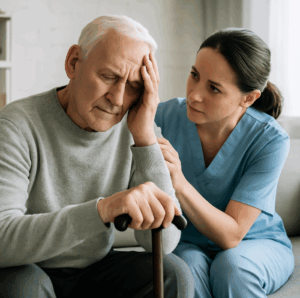Parkinson’s Disease Caregiver Guide: Managing Depression and Psychosis
 Why Caregivers Are the Frontline
Why Caregivers Are the Frontline
Caring for someone with Parkinson’s disease (PD) means dealing with more than tremors and stiffness. Many families are surprised when their loved one develops depression, apathy, or hallucinations — symptoms that can be as disabling as the motor problems. Understanding these changes and learning how to respond can make caregiving less overwhelming and more effective.
1. Recognizing Depression in Parkinson’s
-
What it looks like:
-
Withdrawal from social activities.
-
Loss of interest in hobbies.
-
Hopelessness or fatigue not explained by motor symptoms.
-
-
Why it happens: changes in brain chemistry (dopamine, serotonin, noradrenaline), combined with the burden of a chronic illness.
💡 Tip for caregivers: Don’t dismiss low mood as “just part of Parkinson’s.” Depression is treatable. Early recognition can improve both movement and motivation.
2. Supporting a Loved One with Depression
-
Encourage gentle physical activity — even short walks help mood.
-
Create a daily routine with meaningful activities.
-
Offer emotional support, but avoid pressure or criticism.
-
Encourage follow-up with the doctor for antidepressant treatment (SSRIs like sertraline are safe in PD).
-
Explore counseling or CBT, which helps with both mood and coping.
3. Understanding Psychosis in Parkinson’s
-
Common signs:
-
Visual hallucinations (seeing people, animals, or children that aren’t there).
-
Delusions (false beliefs, like being watched).
-
-
Why it happens: disease progression or side effects of dopaminergic medications.
💡 Tip for caregivers: Stay calm. Arguing with a hallucinating person rarely helps — reassurance and gentle distraction work better.
4. Helping a Loved One with Psychosis
-
Keep the environment calm, well-lit, and familiar to reduce confusion.
-
Remove clutter or shadows that may trigger illusions.
-
Track medication changes — new hallucinations may be linked to drugs like dopamine agonists or anticholinergics.
-
Involve the doctor early. Adjusting medications often reduces symptoms.
-
If needed, certain antipsychotics (like quetiapine or clozapine) can help without worsening movement problems.
5. Taking Care of Yourself as a Caregiver
-
Hallucinations or delusions can be frightening. Seek support groups to share experiences.
-
Take breaks: respite care, family rotation, or day-care programs can give you rest.
-
Watch your own stress levels — caregiver burnout is common and real.
6. When to Seek Immediate Help
-
Sudden worsening of hallucinations or agitation.
-
Aggression or unsafe behaviors.
-
Thoughts of self-harm (in depression).
Key Takeaway
In Parkinson’s, depression and psychosis are part of the illness, not signs of weakness or “losing control.” With the right treatment and caregiver strategies, patients can live fuller, safer lives — and caregivers can avoid exhaustion by seeking support and sharing the load.
About the Author
Dr. Srinivas Rajkumar T
Consultant Psychiatrist
Apollo Clinic, Velachery, Chennai
📞 85951 55808
Dr. Srinivas writes at srinivasaiims.com, where he shares insights on psychiatry, neuropsychiatry, and mental health awareness for students, clinicians, and caregivers.